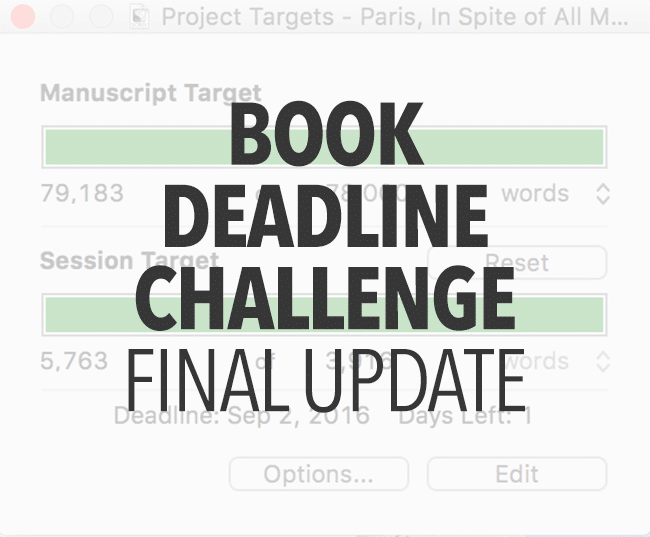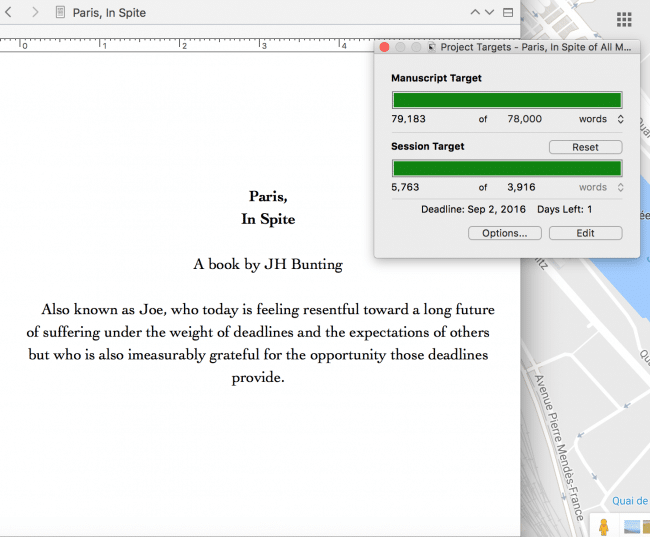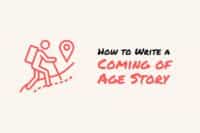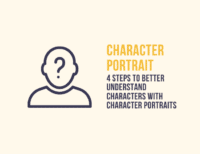A few months ago, I accepted a challenge to finish my book by September 2. The challenge came with stakes. If I missed my deadline, I had to give $1,000 to the presidential candidate I despise the most.
You're probably wondering, “Did you succeed? Or did you have to send that $1,000 check to that presidential candidate you hate most?”
By the way, you can read all the updates from my Book Deadline Challenge here.
So here's the news…

I FINISHED MY BOOK!
The manuscript ended up becoming thirty-eight chapters and 79,183 words long, about eight chapters and 14,000 words more than I had planned. If you read my update from a few weeks ago about scope creep, yeah, it's real.
In today's post, I want to share what I learned in the last few weeks of finishing my book (you can also check out earlier book writing lessons and updates here):

1. Consequences Create Focus
One of the biggest things I've learned is the power of consequences. My friend Tim Grahl taught me that setting a consequence, like writing a $1,000 check for an organization you hate, is one of the best ways to destroy procrastination.
It worked. I was amazingly focused on my goal throughout the whole challenge. I wrote hard almost every day. And even more impressive, I was focused during a very busy season of life, because I had to write my book while going out of town three times (to Colorado, Portland, and Santa Barbara), attending two conferences, launching a new program here on The Write Practice, taking care of my three- and one-year-olds, and working my more than full-time job. The last few weeks were especially stressful as I raced to finish my deadline.
But it was all worth it when I finished that last chapter.
I'm now applying what I learned about consequences to help other writers in our 100 Day Book Challenge, the only writing program with built-in consequences, and people are already telling me how consequences are helping them stay focused.
2. Writing Shouldn't Be Emotional
Writing is a soul-baring activity, and as such it can feel both amazing and terrifying. You're sharing feelings, events, thoughts, stories you may not have shared with anyone before.
However, it can also feel completely normal, mundane even. Your writing is just you after all, and you're pretty used to you.
This balance between vulnerability and the mundane can set you up for a trap, and I've found that writing gets much more difficult if one of two things happens:
- You over-romanticize the writing process and what you're writing about. It's easy to get caught up in what you're doing. You're sharing your soul! You're living an artistic lifestyle! Everything is amazing! However, this sets you up for the following:
- You're not content with yourself. It's easy to doubt yourself, to feel like you need to create some kind of spectacle or make your writing more than you. Won't people be bored with you? And besides, isn't the writing process supposed to feel grand and artistic every day? Why does it so often feel so normal?
The key is to manage your emotions. Don't let yourself get too high, too caught up in what you're doing. At the same time, don't let your self-doubt and insecurity make you question the writing process itself.
Instead, just write. Just do the work. Show up every day. It's not glamorous. It doesn't feel that creative or artistic. It's also the only way to finish.
3. Find the Right Partner
I wrote my first book in 2010, finishing it about two months after I started dating Talia, who would later become my wife. I'm not sure I could have written that first book without her, but I know I couldn't have written this book without her.
The right partner doesn't have to be your spouse or significant other. It might be a writing mentor, your best friend, or your parents.
However, what I've found again and again is that the people you surround yourself with are essential to your success or failure. They propel you forward or hold you back.
Find someone who can help propel your writing forward (even if you have to hire them to be your coach).
4. Beware Writing Burnout
Four days after finishing my book, a wave of depression hit me.
I remember the exact moment it happened. I was walking with Talia and the boys by the beach in Santa Barbara. It was a cloudy, cool evening. All of a sudden, I felt lethargic, like I just wanted to lie in bed and do nothing, not watch TV, not read a book, just stare out the window.
I've been writing and working on creative projects for long enough to know exactly what was going on.
I had writing burnout.
Burnout, for me, feels a combination of exhaustion, boredom, and meaninglessness.
For months, I had been focused on finishing this project. It had given so much purpose and meaning to my life. And now that it was over, I was adrift in a sea of purposelessness.
Now what? I thought. But at the same time, I felt exhausted, unable to move on to another project. Stuck between exhaustion and purposelessness, depression followed.
In the past, I've made the mistake of dropping everything in the midst of burnout. I've even woken up from my depression months later, wondering why I'm so unhappy and so isolated.
This is the exact opposite of what you should do.
If you ever find yourself burnt out at the end of a big project, do this instead:
- Keep moving. Burnout is a reminder that you need more purpose in your life, but if you stop everything you're doing, you'll find it's really hard to rediscover purpose. Keep pressing into your life, and you'll find it so much faster.
- Reach out to others. In the stress of a big project, you probably had to say no to some of the people closest to you. Reconnect with your friends and family, and start to make new relationships that will help you in the next season.
- Grieve. The fastest way to get over something is to go through it. Allow yourself to feel your feelings. Did your book not turn out the way you wanted? Is your life pretty much the same after you wrote it as it was before? Consider journaling through your emotions. Then, remind yourself of all the ways you can make an impact in the future, and get started.
5. The Real Work is Just About to Begin
I'm not happy with my book. Of course I'm not. Good writing is rewriting.
But really, I'll probably never be happy with it. What I have in my head will always be better than what I can put on the page.
My standards will always be higher than the skill I have to meet them. That's okay, normal even. I'm content in the midst of the lack of contentment.
About Publishing
I've never had any of my books published. I've helped clients and friends get published, but I've never had my any of my own books published by a New York publisher.
For this book, I want to make it happen, and I would love to invite you to follow along the publishing process.
If you've ever wanted to see inside the publishing process from a writer's perspective, I'd love to have you follow along as I try to get my book published.
I'll be talking about self-publishing vs. traditional, how to write a book proposal, how to get the right agent, how to deal with publishing contracts, and more. You'll also see all the mistakes I make along the way, so you can avoid them.
If you're interested in following along as I work to get my book published, you can sign up for the series here. I won't be publishing this on The Write Practice, so signing up will be the only place to get it. It would be fun to have you.
Have you ever finished writing a book? How did you feel about it afterward? Let me know in the comments!
PRACTICE
Have you been struggling to finish a writing project? Today, spend some time working on either your work in progress or a writing piece you haven’t worked on in a while. Write for at least fifteen minutes.
When your time is up, share one paragraph of your practice in the comments section of this article. And if you share, please be sure to give feedback to at least three other writers.
Happy writing!







I’m currently reading a book by John Green. In the chapter I’m on his main male character is realizing that a friend of his may not want to be found. This evokes in the male character a type of sadness and quiet determination to find her.
Thanks so much Joe, for your article about writing your book.
You are generous to share all the details with us, and of how you felt once the book was finished. I finished my book, met the deadline spot on, and while waiting for results to see if my book was a winner, I lived in suspended animation. When the winner was declared, (not me), I felt empty, wondering what to do with the novel. Now at last I’ve decided to revise it and offer it to an online publishing house. Who knows where it will take me, but try, I must. Since I decided on this, a new fire is kindled within me, helping me to ‘want’ to revise.
I don’t want to put the whole first chapter here because it is too long to engage a member’s time.
I subscribed for ‘the series’. I’m looking forward to learn how you worked your way through.
I wish you loads of success with your book.
Lilian
That’s so great that you’re working on revising your book, Lilian. I really do believe all good writing is rewriting. Editing isn’t easy, but you’ll be so much happier with your book afteward.
In word, how do you separate chapters without additional words (like typing Chapter One at the beginning of chapter one.)??? This puzzles me, bc/it adds to the word count and basically cheats you of word count.
Well, it doesn’t add much to your word count. If your book runs 30 chapters, “Chapter X” only gives you an extra 60 words.
Also, the chapter headings are part of the book. Many books have titles for the chapters. It is part of what the reader is reading, so shouldn’t it count in the word count?
I don’t know. I use Scrivener and they don’t include chapter headings as part of the word count. But also what Bruce said. 🙂
Congrats on finishing your book (and getting out of giving money to a presidential candidate you despise)! Your success story is inspiring. Hope the publishing process is a success as well.
I agree this post was inspirational. Would you consider using such a challenge with regard to your own work?
I’m a little skeptical about the thought of a serious challenge. I’d be afraid I’d just back out if it looked like I wouldn’t be able to make the deadline. I’d need serious accountability to motivate me. 🙂 It would be nice if my drive to write a novel was strong enough that I didn’t need a challenge like this… Thanks for asking!
I would definitely simply back out of such a challenge. What is working for me now as I am writing my first novel is the help of one friend who has become a fan of the book. I am sending her three chapters each month. There is “fudge room:” for example, I only sent two chapters last month. But if she goes too long between chapters she’ll likely lose interest in the story. The possibility she would be disappointed by my not finishing the book motivates me far more than sending money to a presidential candidate.
Of course, that’s just what’s working for me.
That’s an excellent motivation.
Thanks. I think the motivation that works is the best motivation.
Honestly, I almost tried to. I was two weeks away from the deadline, and I was well on track to finish my original goal of 65,000 words, but I hadn’t counted on scope creep. I realized it was going to be 10-15k words longer and tried to talk my way out of it with “the holder of the check.” They said basically, “Sorry! The promise wasn’t to finish 65,000 words but to finish your BOOK. You don’t finish, the check gets sent!” Needless to say, things got intense after that.
What a great confession, and an important part of your story.
The key was actually writing the check and giving it to a friend to send if I fell short.
Makes sense. That took some courage! 🙂
Courage. Or ignorance. Sometimes it’s the same thing!
Yeah, but knowing me like I know me, the check would just get sent.
Thanks Ryan! Me too!
Congratulations on finishing your book. Seven years ago I completed my first novel in the midst of a real-life family tragedy. Being able to live in the world of the characters I had created helped me through that very difficult time. The real shocker came after I published the book on CreateSpace and realized I had no idea how I was going to market the book. I had no promotions budget, so just did what I could to let friends and colleagues know and used social media to spread the word. It’s still selling a bit here and there, which is amazing after all this time, but has never achieved significant sales. Since then I’ve been involved in academic writing and editing and am just returning to my own writing. This time I’ll know that the big challenge for me will come in the post publication stage. I love the writing process itself, becoming immersed in the story that my characters tell me.
Hi there! I can relate to your experience. I had my first book published by a small hometown publishing company. I was so thrilled when they accepted my manuscript that I did not dwell on future actions–sales (book promotion). As the publisher I used is small they do not have the staff to launch promotional campaigns. That is my responsibility. So, I’m like you in this area–I am learning as I go. Good luck to you.
Thank you, Beverly. I’m glad I’m not alone with the challenge of promoting. My husband and I are getting ready to use CreateSpace to publish a travel book. Although I’m a bit better prepared for the promotion phase this time, I know it will still be daunting.
Thanks, Dr. Jeane, and congratulations to you too on your book. Yes, publishing and promotion is a whole different animal, and something most authors aren’t prepared for. I hope I can shed some light on the process through my series. Anyway, thanks for reading!
Thank you for your comments. I’ll look forward to something on the promotion end of things.
Congratulations on finishing your book. I can see how this strategy would be a definite motivator. I’m going to keep this strategy in my arsenal to use when I need such motivation.
Sounds great, Beverly. Good luck and let me know if you use it!
Good article. I think I may be really emotional about my writing. It is a personal experience. Thanks.
It is indeed! The trick is being both personal and impersonal, finding some distance from it while also being wholly invested in it. I’m not saying that’s possible or easy, but it’s the goal.
Okay, will do. And, congratulations!
Thanks!
Well done Joe. Really, what person with any degree of sanity would want to give $1,000 to either candidate. A damn fine consequence indeed. Also, excellent points on what you learned, especially #2 on emotions. I’m two chapters away from completing my second novel and the “resistance” is a bear. I like your idea of forcing myself to donate $1,000 to one of the candidates. However, as I am short of cash at the moment, I’d be grateful if you would send me the $1,000 you saved through your grit and determination. Congrats!
Hey Doug. You’re on your own with your consequence money! Haha. 🙂 Good luck with your novel. How exciting. I just hope that last two doesn’t turn into 4 like it did for me!
Joe, This post is the most authentic writing yiu have offered us . Thank you for sharing your creatve tips. When I set a deadline or one is imposed on me, such as for an author interview I am excited to submit, I can work quickly and professionally, as well as passionately. I think it will be some of my best work! Happy for your accomplishment and looking forward to reafing more ideas about your pub process. Finding the balance with a family boggles my mind. Tell Talia you rock!
Thank you so much, Beth! I’m glad you found it to be authentic. This process was fun and boring and amazing and hard, and I hope I’ve captured some of that in this series.
Congratulations Joe! Thanks for sharing your journey with us
Thank you for following along, Em! It was tough but worth it!
I’ve completed four manuscripts and published one novel. Finishing a book is the BEST feeling ever. I’m so happy for you and wish all the best in your journey to publication. m3
Thanks Marcy! I think you have a better experience of finishing than I do. It was definitely a good feeling, but not better than sitting around a fire with a bottle of wine and a group of friends. The process as a whole, though, was really fun.
Great post! Out of curiousity what were the consequences for you?
Congrats on finishing! 🙂
Thanks Mia. As I mentioned, if I didn’t finish my book by the deadline, I had to send a $1,000 check to the presidential candidate I don’t like.
Oh man, i don’t know why but I thought that was just an example!! 😮 Very big consequence indeed!
Congrats on finishing your book, Joe! I’m new to The Write Practice (I found out about you through Jeff Goins’ podcast), and I’m excited to learn from you on your publishing journey. I wish you all the best as you share your process with us.